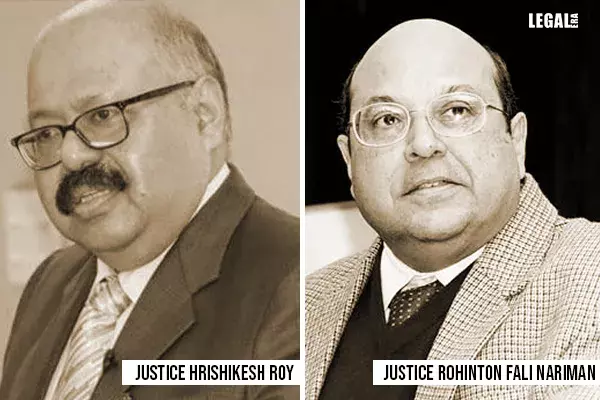Supreme Court: When Parties Choose A Place As Seat of Arbitration, Courts Get Exclusive Jurisdiction To Regulate Arbitral Proceedings
The Supreme Court (SC) in the case titled M/S Inox Renewables Ltd. (Appellants) v. Jayesh Electricals Ltd. (Respondents);

Supreme Court: When Parties Choose A Place As Seat of Arbitration, Courts Get Exclusive Jurisdiction To Regulate Arbitral Proceedings The Supreme Court (SC) in the case titled M/S Inox Renewables Ltd. (Appellants) v. Jayesh Electricals Ltd. (Respondents) held that the moment a place is chosen as the seat of arbitration, it is akin to exclusive jurisdiction clause, vesting Courts at the...
Supreme Court: When Parties Choose A Place As Seat of Arbitration, Courts Get Exclusive Jurisdiction To Regulate Arbitral Proceedings
The Supreme Court (SC) in the case titled M/S Inox Renewables Ltd. (Appellants) v. Jayesh Electricals Ltd. (Respondents) held that the moment a place is chosen as the seat of arbitration, it is akin to exclusive jurisdiction clause, vesting Courts at the agreed place with exclusive jurisdiction to regulate arbitral proceedings.
The SC bench comprising of Justices Rohinton Fali Nariman and Hrishikesh Roy ruled held that the venue of arbitration will be the juridical seat of arbitration in the absence of the contrary intention of the parties.
The factual background of the case is that Gujarat Fluorochemicals Ltd (GFL) and the respondent had entered into a purchase agreement in January 2012. Jaipur, Rajasthan was agreed by the parties as to the venue of arbitration as per the arbitration clause in the agreement. Subsequently, a slump sale of the entire business of GFL took place in favour of the Appellant, Inox Renewables Ltd.
The said arrangement was made as per a business transfer agreement executed between the Appellant and GFL to which the Respondent was not a party. The business transfer agreement between them had Vadodara as the seat of Arbitration.
Later, GFL sold its entire business to Inox Renewables Ltd. The business transfer agreement between GFL and Inox also had an arbitration clause, which fixed the venue at Vadodara, Gujarat, and gave Courts at Vadodara exclusive jurisdiction.
An arbitrator was appointed who was a retired judge of the High Court (HC) and it was jointly agreed by the parties that Ahmedabad would be the venue of Arbitration though the initial agreement had Jaipur as the venue.
An award was passed in favour of the respondent, a petition u/s 34 of the Arbitration and Conciliation Act, 1996 (Arbitration Act) was moved by Inox and the said plea was opposed by the respondent wherein it contended that the Courts in Vadodara would have jurisdiction.
The Commercial Court, Ahmedabad, agreed with the respondent, and reliance was placed on the business transfer agreement to hold that the Courts at Vadodara alone would have exclusive jurisdiction and not Ahmedabad.
It was observed by the HC that the Court in Jaipur would have jurisdiction but did not set aside the Commercial Court order.
An appeal was filed before the Top Court and the SC set aside the Commercial Court and the HC order by mentioning that "The moment the seat is chosen as Ahmedabad, it is akin to an exclusive jurisdiction clause, thereby vesting the courts at Ahmedabad with exclusive jurisdiction to deal with the arbitration."
The Apex Court further noted that the parties may mutually arrive at a seat of arbitration and may change the seat of arbitration by mutual agreement. It added that such change of place was recorded by the arbitrator in his award to which no challenge was made by either party.
The SC placed reliance on the precedent in Indus Mobile Distribution Private Limited v. Datawind Innovations Private Limited, (2017) 7 SCC 678, and said that the 'place of seat/ venue' being shifted from Jaipur to Ahmedabad is really a shifting of the seat of arbitration with reference to Section 20(1), and not with reference to Section 20(3) of the Arbitration and Conciliation Act, 1996.
It further stated as it has already clarified that as the parties have mutually agreed to shift the venue from Jaipur to Ahmedabad, now the new venue would be considered as the place of arbitration. The SC has dismissed the argument that jurisdiction of Courts in Rajasthan is independent of the venue being at Jaipur.
The SC bench stated that "Once the seat of arbitration is replaced by mutual agreement to be at Ahmedabad, the courts at Rajasthan are no longer vested with jurisdiction as exclusive jurisdiction is now vested in the Courts at Ahmedabad, given the change in the seat of arbitration."
The appeal was allowed holding that Ahmedabad Court had the jurisdiction to deal with the Section 34 petition. It concluded, "This case would show that the moment the seat is chosen as Ahmedabad, it is akin to an exclusive jurisdiction clause, thereby vesting the Courts at Ahmedabad with the exclusive jurisdiction to deal with the arbitration."





